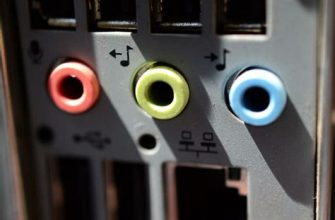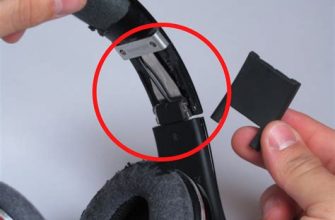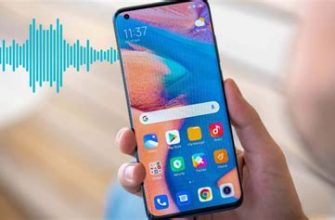In today's modern world, where technology plays an integral role in our lives, headphones have become a ubiquitous accessory for many. They allow us to experience music, podcasts, and audio entertainment in a way that is personal and immersive. However, the convenience and pleasure derived from prolonged headphone usage may not come without consequences.
For individuals who consistently indulge in headphones, there is a growing concern about the potential impact on their hearing health. Prolonged exposure to loud sound levels can lead to a variety of auditory complications, diminishing our ability to perceive sounds to their full extent. As a result, scientists and experts are continuously exploring innovative methods to restore sound perception and mitigate the adverse effects caused by headphone usage.
Recognizing the unique challenges posed by this issue, researchers have embarked on a quest to discover effective approaches for reclaiming our auditory capabilities. These approaches go beyond simply alleviating the symptoms; they delve into the intricate mechanisms of our hearing system, aiming to facilitate genuine restoration and rejuvenation.
Understanding the Impact of Headphone Usage on Auditory Health
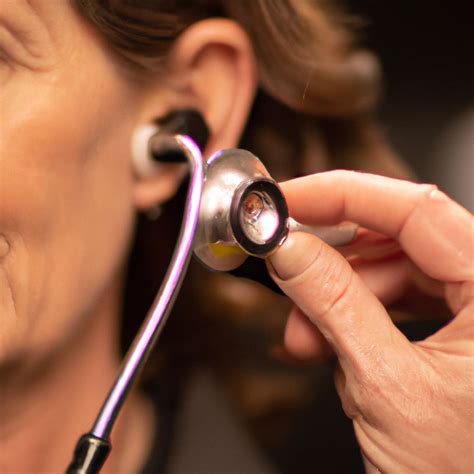
Exploring the various factors that contribute to the consequences of using headphones is crucial in comprehending the effects it has on our hearing abilities. By gaining a deeper understanding of the impact, we can strive to find effective approaches to mitigate potential damage and promote healthy auditory functions.
| Factors | Explanation |
|---|---|
| Volume Levels | The intensity of sound played through headphones plays a significant role in determining the impact on our hearing. Prolonged exposure to high volume levels can result in noise-induced hearing loss. |
| Duration of Use | The length of time one spends wearing headphones can influence the potential harm to auditory health. Extended periods without breaks may heighten the risk of detrimental effects. |
| Noise Isolation | The level of noise isolation provided by headphones can impact the volume levels needed to achieve satisfactory sound quality. Headphones with poor noise isolation may lead to higher volume settings, enhancing the risk of hearing damage. |
| Personal Susceptibility | Individuals may vary in their susceptibility to headphone-induced hearing issues. Factors such as age, pre-existing hearing conditions, and genetics can influence the extent of damage caused. |
| Listening Practices | The listening habits of individuals, including the genres and types of audio content they engage with, can impact the potential harm to their hearing. Continuous exposure to loud and intense sounds may lead to negative consequences. |
By recognizing the influence of these factors on auditory health, individuals can make informed choices regarding their headphone usage. Understanding how headphones can affect our hearing empowers us to adopt safer practices and seek appropriate methods for preserving and restoring auditory function.
The Hazards of Prolonged Usage of Headphones
Extended periods of wearing headphones can pose serious risks to our auditory health and overall well-being. The excessive use of headphones can lead to a range of detrimental effects, compromising our ability to hear and potentially causing long-term damage to our ears.
One of the major concerns associated with prolonged headphone use is the potential for noise-induced hearing loss. When we listen to music or other audio through headphones at high volumes for extended periods, the delicate structures within our ears can become damaged by the excessive loudness. This can result in a gradual loss of hearing over time and may require intervention to restore normal function.
In addition to hearing loss, another hazard of excessive headphone use is the increased likelihood of developing tinnitus. Tinnitus is a condition characterized by the perception of ringing, buzzing, or other persistent sounds in the absence of external noise. It can be extremely bothersome and impact our quality of life, making it difficult to concentrate or enjoy activities that require quiet environments.
Furthermore, prolonged headphone use can contribute to the development of ear infections. The constant presence of earphones in our ears creates a warm and moist environment that is conducive to the growth of bacteria or fungi. This can result in ear inflammation and infection, leading to discomfort, pain, and potential complications if left untreated.
| Overall Risks: | Noise-induced hearing loss | Tinnitus | Ear infections |
It is important to recognize the potential hazards associated with prolonged headphone use and take measures to mitigate the risks. This can include limiting the duration and volume of headphone use, taking regular breaks, and using noise-canceling or over-the-ear headphones instead of in-ear models. By being mindful of our auditory health and implementing preventative measures, we can protect our hearing and ensure long-lasting auditory well-being.
The Connection Between Loud Music and Hearing Impairment
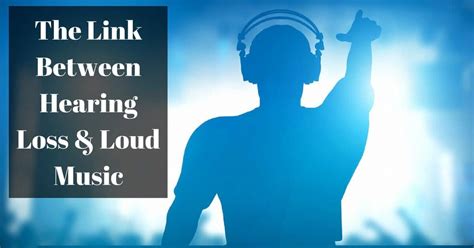
In this section, we will explore the correlation between listening to excessively loud music and the potential consequences it can have on our hearing ability. Sound is an integral part of our lives, but when it reaches high levels, it can pose risks to our auditory health. The human ear is a delicate organ that can only withstand a certain amount of noise before it becomes susceptible to damage. Thus, it becomes crucial to understand the link between loud music and hearing loss.
Impact of Excessive Sound:
Listening to music at high volumes through headphones or speakers has become a popular way to enjoy our favorite songs. However, prolonged exposure to loud music can have detrimental effects on our hearing. The delicate sensory cells in our inner ear that are responsible for converting sound vibrations into electrical signals can be damaged when exposed to excessive sound pressure levels.
The Role of Intensity and Duration:
It is not only the loudness of the music but also the duration of exposure that plays a significant role in hearing impairment. Continuous exposure to high-intensity sounds, whether at concerts or through headphones, can lead to permanent damage, as our ears do not get enough rest to recover. The longer and louder the exposure, the higher the risk of developing hearing loss.
The Importance of Safe Listening Practices:
Understanding the link between loud music and hearing loss underlines the importance of practicing safe listening habits. Implementing strategies such as reducing volume levels, taking breaks during extended listening sessions, and using noise-cancelling headphones can help minimize the risks. Additionally, it is crucial to encourange regular hearing check-ups and be aware of early signs of hearing damage, such as ringing in the ears (tinnitus) or difficulty understanding conversations.
In conclusion, the correlation between loud music and hearing impairment is evident. By being mindful of our listening habits and taking the necessary precautions, we can enjoy music without compromising our auditory health.
Exploring the psychology behind addiction to headphones
Understanding the underlying psychological factors that contribute to headphone addiction is crucial for addressing and treating this increasingly prevalent phenomenon. Instead of focusing solely on the physical effects of prolonged headphone use, this section delves into the intricate relationship between psychology and the recurring need to rely on headphones.
One of the main psychological factors driving headphone addiction is the mind's inclination towards escapism. Headphones provide a sense of detachment from one's immediate surroundings, allowing individuals to create their own personal bubble in which they can escape from stress, noise, and social interactions. The headphones become a psychological shield, blocking out external distractions and providing a temporary refuge from the pressures of daily life.
In addition to escapism, headphone addiction also stems from the desire for control. Wearing headphones enables individuals to curate their auditory experiences, giving them the power to choose the sounds they want to hear. This sense of control provides a sense of autonomy and mastery over one's environment, which can be highly addictive, leading to increased reliance on headphones as a means of achieving a predictable and controlled soundscape.
Furthermore, the psychology behind headphone addiction can be linked to the emotional aspect of music and sound. Listening to music through headphones has been shown to stimulate the release of dopamine, a neurotransmitter associated with pleasure and reward. As a result, individuals may develop a psychological dependence on headphones as a means of seeking emotional gratification and enhancing their mood.
Lastly, headphone addiction can also be influenced by social factors. With the rise of portable music and streaming platforms, headphones have become a ubiquitous accessory in public spaces. This normalization of headphone use, combined with the desire for social acceptance and conformity, can lead individuals to use headphones excessively as a way to fit in or avoid feeling out of place.
- Escapism
- Desire for control
- Emotional gratification
- Social acceptance and conformity
By understanding the psychology behind headphone addiction, we can develop effective strategies to address the root causes and provide healthier alternatives to excessive headphone use.
Guidelines for Preventing Hearing Damage While Using Headphones
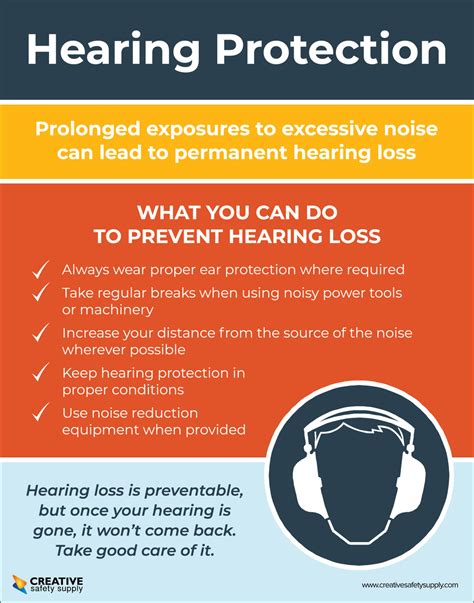
Ensuring the longevity of your hearing capabilities when using headphones is of utmost importance. By adhering to certain guidelines, you can minimize the risk of damaging your hearing and maintain optimal auditory health.
- Avoid excessively high volume levels: One vital precautionary measure involves adjusting the volume to a suitable level. Listening to music or other audio at a reasonable volume can help minimize the risk of hearing damage.
- Take periodic breaks: Prolonged exposure to continuous audio through headphones can be detrimental. Incorporating regular breaks can give your ears a chance to rest, reducing the strain on your auditory system.
- Use noise-canceling headphones: Opting for noise-canceling headphones can provide a significant advantage. By eliminating external background noise, you can enjoy your music or audio content at lower volume levels, reducing the potential for hearing damage.
- Choose over-ear headphones: Over-ear headphones distribute sound more evenly and reduce the amount of sound leakage. This can prevent the need to increase the volume to compensate for inadequate sound quality, safeguarding your hearing in the process.
- Keep the volume within safe limits: It is recommended to maintain the volume on your device at 60% or lower. Practicing this precaution helps protect your hearing and decreases the risk of incurring any irreversible damage.
- Limit headphone usage time: Setting a maximum duration for wearing headphones each day can be an effective strategy. By restricting your exposure to prolonged periods of headphone use, you can minimize the potential harm to your auditory system.
By adhering to these guidelines, you can enjoy your headphones without compromising your hearing health. Prioritizing prevention and taking proactive steps will allow you to savor your audio experience while safeguarding your auditory well-being in the long run.
Choosing the Right Type of Headphones for Ear Protection
When it comes to safeguarding your hearing while using headphones, selecting the appropriate type of headphones is crucial. The market offers various options, each with different features that impact the level of protection provided.
One important factor to consider is the design of the headphones. Over-ear headphones, for example, cover the entire ear and provide a physical barrier between your ears and external noise. This design is known to offer better noise cancellation, preventing the need to turn up the volume to dangerous levels. On the other hand, in-ear headphones fit inside the ear canal and can help block out ambient noise. However, it is important to choose ones that fit properly and do not create pressure or discomfort.
Another aspect to keep in mind is the noise isolation capabilities of the headphones. Some models employ advanced technology to actively cancel out external noise, while others rely on passive noise isolation by creating a seal between the headphones and the ears. Understanding your specific needs and environments in which you will use the headphones can help determine which type of noise isolation is most suitable.
Additionally, considering the sound quality is essential for choosing headphones that provide adequate hearing protection. By opting for headphones with high sound quality, you may not feel the need to turn up the volume excessively to enjoy your music or media. This can help reduce the risk of long-term damage to your hearing.
Lastly, the comfort and fit of the headphones should not be overlooked. Headphones that fit well and distribute pressure evenly can be worn for longer periods without causing discomfort or fatigue. This is especially important for individuals who regularly use headphones for extended periods.
In summary, when selecting headphones for hearing protection, it is important to consider the design, noise isolation capabilities, sound quality, and comfort of the headphones. By making an informed decision, you can enjoy your audio experience while prioritizing the health of your hearing.
FAQ
How can prolonged headphone use affect our hearing?
Prolonged use of headphones can damage our hearing by causing noise-induced hearing loss. The loud volume and close proximity of the sound directly to our ears can lead to damage to the hair cells in the inner ear, which are responsible for transmitting sound signals to the brain.
Are there any effective methods to restore hearing after wearing headphones?
Yes, there are effective methods to restore hearing after wearing headphones. One common method is to give our ears a break by taking regular breaks from wearing headphones. Additionally, using noise-cancelling headphones can help reduce the need for high volume levels. If hearing loss has already occurred, seeking medical advice from an audiologist is recommended, as they can provide further treatments such as hearing aids or cochlear implants.
How can we prevent hearing loss while using headphones?
To prevent hearing loss while using headphones, it is important to limit the volume to a safe level. The World Health Organization suggests keeping the volume level below 60% of the maximum volume and limiting the duration of headphone use to less than one hour at a time. Using over-ear headphones instead of earbuds, taking regular breaks, and using noise-cancelling headphones can also help prevent hearing damage.
Can regular exercise and diet contribute to improving hearing after headphone use?
While regular exercise and maintaining a healthy diet can contribute to overall well-being, there is limited evidence to suggest that they directly improve hearing loss caused by headphone use. However, a healthy lifestyle can help improve blood flow and circulation, which in turn can promote the health of the auditory system.
Are there any alternative methods, such as natural remedies, to restore hearing after headphone use?
There is limited scientific evidence to support the effectiveness of natural remedies in restoring hearing after headphone use. While some home remedies like using garlic oil or certain herbs may have anecdotal benefits, it is advisable to seek professional medical advice from an audiologist or otolaryngologist for appropriate and evidence-based treatments.

